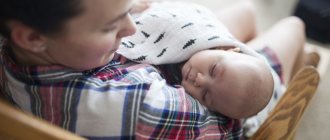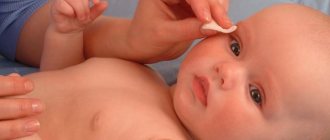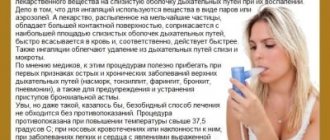How to treat a cough in a baby
Parents often wonder how to treat a cough in a baby? Because not all medications can be taken by young children. Contact the clinic so that the doctor examines the child and finds out what type of cough he has. Treatment depends on this. How to treat cough in a child under one year old? Parents must not only take care of the child, but also maintain the correct regime. Moreover, the mother should not feed the child if he refuses food. More often, children with weakened immune systems are more likely to get viral diseases. Medicines are prescribed by the doctor after making a diagnosis. For example, when a wet cough appears in a 1 month old newborn , it is very difficult for him to clear his throat. In this case, the doctor will prescribe medications that will facilitate the process of removing mucus.
How to treat a cough in a 2 month old child ? When the cough is dry, it is necessary to include in therapy agents that will thin the mucus for its further removal.
How to treat a cough in a 3 month old baby ? As for a baby 1 and 2 months old, the doctor will prescribe treatment with herbal medications. Cough mixtures, for example, based on licorice and marshmallow roots, are considered effective at this age. The doctor may also prescribe medicine in the form of Lazolvan cough syrup. A cough in a 4-month-old child can be treated with expectorants (Ambroxol); breastfeeding also helps.
The doctor also determines how to treat a cough in a 5-month-old child Treatment is carried out using inhalation. Medicines are added to saline solution and the procedure is performed through a mask. The drug is used to convert a dry cough into a wet one.
A cough in a 6-month-old child should also be treated in a complex manner, so it is recommended to use a light chest massage. This action can help improve the resolution of sputum. Give your child more to drink; liquid effectively removes toxins from the human body and thins phlegm.
A cough in a 7-month-old child can be caused by various factors. Babies at this age may be prescribed mucolytics and sputum expectorants. Syrups are considered the most suitable form of cough medicine for newborns. How to treat cough in an 8 month old child? We can cite certain common and at the same time effective substances:
- Bronchicum;
- Ambrobene;
- Linkas;
- Stoptussin;
- Gedelix.
Before giving your baby medicine, carefully study the instructions. To eliminate side effects, follow your doctor's recommendations. A cough in a 9-month-old child can be cured with aromatherapy or inhalation at home. Inhalations are carried out with the addition of concentrates of pharmaceutical herbs, provided that the child does not have a fever or allergies to herbs.
A cough in a 10-month-old child can be treated with herbal syrups using anal suppositories. Rubbing ointments improve blood circulation, helping to improve well-being. Cough in an 11-month-old child can be treated with non-medicinal methods:
- dry compress,
- chamomile tea,
- inhalation with soda,
- massage (drainage) of the chest.
The best substances aimed at eliminating cough in an infant without fever will be recommended by a doctor. Before treating cough in children under one year of age, it is necessary to establish the key prerequisites for its occurrence, since cough is the cause of a disease of the respiratory system.
Complex treatment
☎️ When a symptom of any type appears in a baby, you must first find out whether this is normal or caused by a disease. To do this, you definitely need to go to an appointment with a pediatrician in Moscow if the parents live in the capital, or at their place of residence (see gorps.ru).
Such a small child cannot be treated independently. And treatment should be prescribed depending on the causes of such pathology.
Dry cough medications
There are different medications prescribed for babies. Their use depends on the type of pathology. If the cough is severe and barking, it is necessary to prescribe medications by a doctor.
Antitussives
These medications reduce the activity of the cough focus. They are prescribed only for a strong dry cough, when the baby begins to bark. But medications of this class are not combined with expectorants. Medications prescribed for this pathology include:
- Herbion plantain herb syrup (available only from 2 years of age);
- Eofinil syrup;
- Taisa syrup (allowed from one year old);
- Gedelix, produced in syrup form and approved even for newborns;
- Alteyka (from 2 years old);
- Mucaltin (soluble tablet, approved from 3 years of age);
- Isla-Moos and Eucabal (babies like the latter due to its sweet taste and aroma, allowed from 6 months);
- Pertussin (in the form of syrup, from 3 years);
- Tussamag (in the form of drops, from one year old);
- Erespal.
Sinekod (care should be taken, since the drug has many contraindications).
Most syrups are approved for use from 2 months.
Antibiotics and other drugs
If the pathology is accompanied by an increase in temperature, the doctor prescribes antibiotics.???? If you have a fever, your doctor will order you to take a bacterial culture test to determine the type of virus. And then antibiotics or macrolides may be prescribed, which actively help treat infections.
When detected at ???? a child with asthma, he is prescribed glucocorticosteroid hormones.
Cough in an infant with and without fever
Treatment of infants is carried out exclusively under the supervision of a doctor, according to a specific scheme. The majority of medications and procedures used for adults and even in the treatment of preschool children will not suit them. However, when the cough is severe, before the doctor arrives you need to relieve the attack and help the baby cope with the cough. If your baby has a cough without fever, you should still consult a doctor. What to do when a child has been coughing for about a month, and there is no fever? You need to immediately go to the clinic and rule out asthma and allergies. Low humidity and high dust content provoke coughing with sputum production. The first thing you should do is try to get your baby into bed and ensure he gets as much rest as possible.
When the cough is dry, it must be converted into a wet cough so that mucus is removed from the body. Let's consider ways to treat a cough in a child under one year old without fever:
- observe drinking regime;
- walks daily;
- do not allow dry air;
- temperature not higher than 23 degrees.
Cough with fever in an infant is considered a sign of colds and flu. When the temperature does not exceed 38 degrees, then it does not need to be taken with medications. This is a protective reaction of the immune system, which itself fights pathogenic bacteria. Also, the baby may have snot along with mucus, a sign of fever and cough. Invite your pediatrician home so as not to violate bed rest. Ensure your child receives appropriate care. Like any therapeutic effect, therapy for a cough in a child with a fever must take into account two main conditions: the factor of the appearance of the cough, the characteristics (dry or wet) and the presence of temperature.
Types of cough
Before treating a cough in an infant, it is important to know exactly the cause of its occurrence:
- Viral nature;
- Infectious nature;
- Allergic nature;
- Physiological cough.
Coughing is a protective reaction of the body, since during this action the bronchi and respiratory tract are cleared of accumulated mucus and pathological sputum. Most often, infants develop a cough of a viral nature, that is, as a reaction of the body to the penetration of viruses into the upper respiratory tract.
Along with a cough, the baby may have a rise in body temperature, a runny nose and a sore throat.
Depending on the productivity of the cough, there are:
- Dry cough bothers the child almost constantly, interferes with sleep and eating, and no sputum is produced. In some cases, such a cough may result in the baby vomiting;
- Wet (wet) cough - in pediatrics it is also called productive. Characterized by the discharge of sputum and relief of the general condition of the patient;
- Unproductive - sputum does not come out or is released in small quantities. Against the background of such a cough, body temperature often rises.
Dry cough in an infant
A baby up to 6-7 months is mostly in a supine position, so he may cough several times a day. This is due to the fact that small amounts of mucus from the nose and throat can fall onto the back wall, causing a protective reaction of the body in the form of a cough; in addition, at 3 months, the salivary glands in babies are activated, which can also cause the baby to cough slightly during the day .
Advice! If a dry cough prevents a baby from breastfeeding or causes frequent waking up and crying, it is necessary to show the baby to a doctor as soon as possible, since such symptoms may indicate the development of an inflammatory process in the respiratory tract.
Wet cough
Sputum production indicates the productivity of the cough and the beginning of the healing process. The mother of the baby should carefully monitor the nature of the sputum; normally it is transparent and does not have any unpleasant odor.
Greenish or yellow sputum with an unpleasant odor indicates the addition of a secondary bacterial infection and requires correction of previously prescribed treatment.
Attention! An infant does not yet know how to fully cough up the mucus accumulated in the bronchi, so the mother needs to more often hold the baby in an upright position, stroking the back with massage movements. While the baby has not eaten anything, you can gently press on the root of the tongue - this will cause a cough, thereby causing the coughing up of phlegm.
For dry cough
Treatment of cough in infants differs from other types by the removal of sputum. The treatment option for the disease in a child depends on the underlying cause of the cough. A dry cough in a baby appears due to diseases:
- Viral infections (colds) cause coughing.
- The flu produces symptoms similar to colds, but the condition of children indicates a more serious illness.
- Allergy to cigarette smoke, chemicals.
- Inflammation of the mucous membrane of the esophagus.
- A spasmodic cough may be due to an infectious disease caused by whooping cough.
How to treat dry cough in a child under one year old? Let's look at the drugs that doctors prescribe:
- Ambrobene. Children are prescribed the drug in liquid form. The active element is ambroxol, and the additional elements are sorbitol, raspberry flavor, sodium saccharin and water. Promotes expectoration.
- Gedelix relieves spasms and promotes expectoration. The active element of plant origin is ivy leaf extract. The drug is prescribed to newborns.
- Lazolvan is intended to heal the bronchi and lungs. The functioning element is ambroxol hydrochloride.
Causes of cough
In addition to a short-term obstruction to the passage of air through food or liquid, a cough in a newborn can be provoked by the following reasons:
Acute respiratory viral infections (ARVI). This is one of the most common diagnoses in practical medicine. Every person in the first years of life is faced with attacks from many different viruses. And when these inhabitants of the microcosm cause a cold, the baby almost always starts coughing. Usually, coughing is present at first, followed by sputum production and other symptoms:
- runny nose;
- temperature increase;
- the appearance of plaque on the pharyngeal mucosa;
- loss of appetite, insomnia.
Inflammatory diseases of the respiratory tract. In most cases they are caused by bacteria. Everyone knows such “childhood” diseases as whooping cough and tonsillitis.
At the root of their occurrence lies the contact with the mucous membrane and excessive proliferation of certain microorganisms - pathogens. In some cases, the nature of the cough in an infant has a specific picture:
- with whooping cough, there is a gradual development from a dry, obsessive cough to a paroxysmal, exhausting cough with repetitions (there is a whistling sound when inhaling) and often vomiting at the end of the attack;
- acute bronchitis at different stages is accompanied by different types of cough: at the beginning of the disease there is a dry, “unproductive” cough, but soon after an increase in secretion production in the bronchi, increased sputum production is often observed;
- During a sore throat, an infant's cough is not very characteristic: both a dry and a wet cough may be present.
Ear diseases – hearing problems may be accompanied by irritation of the cough reflex. For example, sulfur plugs and some inflammatory processes. The cough is dry and disappears as soon as the primary cause of the pathology is eliminated.
Allergy – cough in a newborn often occurs as a result of a reaction to an allergen that irritates the mucous membrane. It is usually dry and accompanied by other local and general allergy symptoms.
Inappropriate air properties - a person, especially a small person, feels comfortable within certain ranges of humidity, temperature and air composition.
Even minor deviations in indicators can irritate the receptors of the pharynx and larynx.
Penetration of various objects into the respiratory tract. The condition is characterized by a hacking cough. If the child is unable to cough up a foreign body in the very near future, it is necessary to urgently seek medical help.
Separately, it is worth noting that in infancy, a cough can provoke a process such as teething. It may be accompanied by other symptoms - fever, rhinitis, rare bowel movements. The growth of the first teeth can provoke a wet cough in an infant. There may then be slight irritation around the mouth due to excessive production of saliva and phlegm. This condition does not require special treatment and usually goes away on its own within two to three days.
For a wet cough in a baby
A child with this type of cough may cough up mucus. A wet cough should not be held back as it helps clear the lungs. Key prerequisites for the occurrence of cough with sputum production:
- Viral diseases when mucus flows down the wall of the throat.
- Infections of the lungs (protracted) or upper respiratory tract.
- Appears due to diseases of the gastrointestinal tract.
- It is necessary to help the child eliminate phlegm.
Consult a doctor, because self-medication is not safe for the baby’s health.
If you have a runny nose and cough
Cough and snot in a baby can appear for various reasons, especially before bedtime. A runny nose and cough in an infant should be treated immediately at the first manifestation of symptoms so that the disease does not become chronic. We treat cough, snot without high fever in a child:
- To clean your nose, you need to use Aquamaris with sea salt in the composition. Wait a couple of minutes after instillation and clean your nose with an aspirator.
- When the baby has trouble breathing through his nose, you can instill vasoconstrictor drops (Nazol baby).
- When a newborn has a cold or cough, you can use the method of warming and massaging the points along the edges of the wings of the nose. Your pediatrician will always tell you what helps with a cold cough and runny nose.
Treating cough
- The air in the apartment must be constantly humidified (at least 60%).
- You can give your baby chamomile tea (a teaspoon up to 5 rubles a day).
- The throat can be lubricated with propolis tincture (up to 3 times a day).
- For dry coughs, inhalations with eucalyptus or soda are effective.
When a baby has a cough and runny nose, rhinitis may cause fever, so
you should see a doctor immediately.
Inhalations for infants
Children under three years of age have a weak immune system, so they often get sick. A pediatrician may prescribe inhalation for coughing as a treatment for infants. This therapy is safe, since the elements of the drugs are plant-based. It is better to use inhalations, since sprays can cause swelling, and tablets can disrupt the functioning of the gastrointestinal tract. The most common at the moment are considered nebulizer inhalations. Drugs for the device should be prescribed by a doctor in order to minimize all possible side effects.
Why inhalations and how are they better than other means? Let's consider the advantages:
- Moisturizing the mucous membranes, which helps to eliminate soreness.
- A wet cough is good for removing phlegm.
- Drug vapors act on the source of inflammation.
- The steam reaches the lungs and destroys pathogenic microorganisms.
- Inhalation is effective for rhinitis.
What drugs can be added during inhalation:
- Ambrobene promotes expectoration.
- Berodual relieves spasms in the bronchi.
- Pulmicort eliminates inflammation.
- Lazolvan promotes expectoration and removal of sputum.
Before using a treatment method such as inhalation, you should definitely consult a doctor who will prescribe you a specific drug to treat cough.
Tips, recommendations
When a newborn coughs (whether he has a fever or not), parents should contact a doctor for examination and treatment. Not always traditional methods of treatment can help the baby. To help the baby, the mother should follow the following recommendations:
- The air in the room should be humidified, not dry, as it will be easier for the child to breathe.
- In addition, it is very important to humidify the room where the child sleeps during the heating season, because hot radiators dry out the air very much. In this case, you can buy a humidifier or make one yourself. To do this, you need to take a jar or other container with water and place it on the battery. The water will begin to evaporate and the humidity in the room will rise.
- It is necessary to make the air in the room fresh. Ventilate the room constantly, up to twice a day. Such manipulation is necessary so that the baby’s well-being does not deteriorate, because fresh air has a beneficial effect on well-being. A lack of oxygen will only worsen the condition of your baby’s respiratory system.
- It is important to massage your child. In this way, phlegm can be removed.
- Let your child drink frequently so that toxic substances are removed from the body. Especially when body temperature is elevated.
- Rubbing with animal fat before bed. Don't forget about walking outside if there is no high temperature.
Folk ways to get rid of cough in infants
In addition to drug treatment, you can also turn to alternative medicine. Coughs can be cured at home with warm compresses and lotions. You will need camphor oil, mashed potatoes, badger fat and some mustard powder. From these components you need to fashion a soft cake. The compress is applied as follows:
- 2-3 layers of gauze or any thin clean cloth;
- ready mix;
- cling film or plastic bag;
- bandage or gauze.
The lotion is placed only on the chest. Under no circumstances should compresses be used at elevated temperatures. It is also possible to cure a baby with the help of medicinal herbs: mix the root vegetables of licorice, marshmallow and elecampane. Pour one tablespoon of plants into a jar and add 0.5 liters of warm water. The decoction should steep for 8-10 hours, after which you will need to strain it from the grounds and give 45 ml twice a day.









